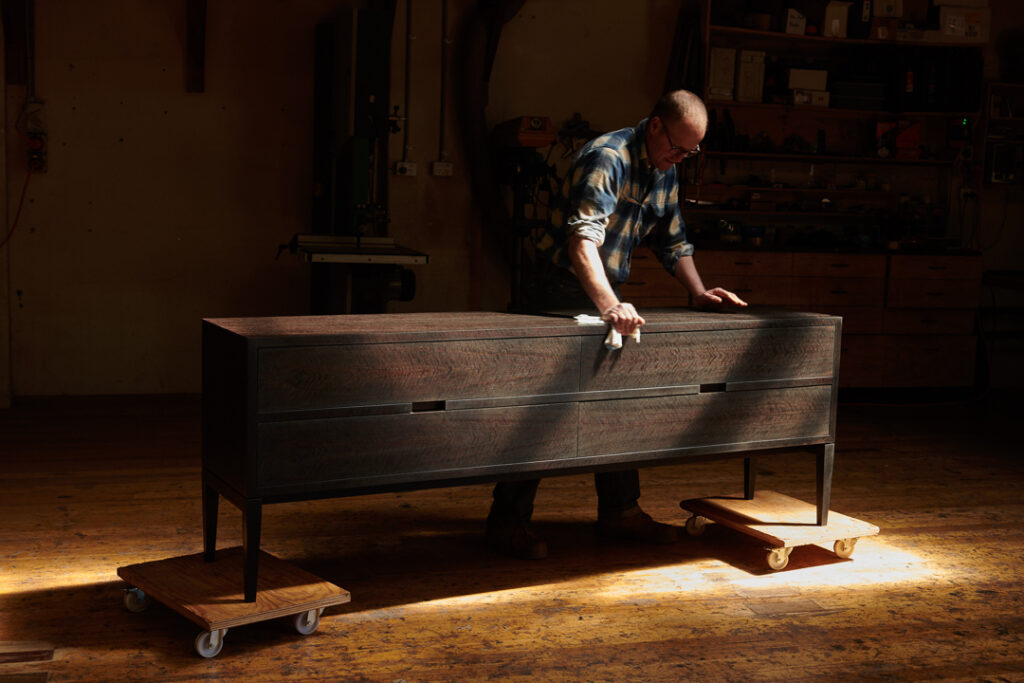
Immediate gratification has weakened our social fabric. Craft can restore the essential virtue of patience.
“Too easy.”
The other day, I was looking on the website of a local retailer for a keyboard replacement. For a moment, I considered whether I would have it delivered or not. It would mean a wait of a couple of days. But then I saw an option to have it delivered by an Uber driver within an hour, for about the same price as a normal delivery.
How convenient! But something about this felt wrong. It was too easy. The whole world of online shopping could soon be at my door.
Additional stores are bound to incorporate Uber into their online businesses, capitalising on the pools of gig-drivers circling for work. But more, will my own capacity to wait gradually decrease?
Home delivery services are expanding, particularly since COVID. We see it everywhere. Amazon Prime offers same-day service. The local bank has Amazon delivery lockers. Airports now have zones specifically for Uber rides. My local Lebanese restaurant now has a dedicated Uber counter for pickups.
What’s not to like? We all celebrate the added convenience. Who wants to stand in a queue?
There is a hidden cost. Cory Doctorow calls it the “enshittification” of platform capitalism. The initial benefits it offers to gain a monopoly of the market are abandoned once consumers are locked in. Relative to Marxist theory, Yanis Varoufakis sees it as “techno-feudalism”.
But the downside extends beyond monopolisation. Online shopping platforms are solitary spaces. For the sake of convenience, we can now avoid interacting with others. Thanks to the Uber app, we no longer need to talk to drivers about our destinations. The only contact gig workers have through their work is an algorithm.
This has an impact beyond increased levels of loneliness. We’ve also seen a rise in social conflict. Our politics reflects greater partisanship, with each side casting the other are irredeemable villains, or even aliens according to some conspiracy theories. All that is in plain view.
But there are also everyday experiences of social decline. Rates of membership and volunteers have gone down. A recent study showed a significant increase in accidents since COVID, largely due to impatience on the road. Even an attempt to cheer up passengers on Melbourne trams with pop-up choirs received an angry response from those who resented the interruption. Don’t get between me and the dopamine hit of my Insta feed!
“Patience is a virtue” may seem like a truism, but there are studies to prove it. In the classic Stanford experiment, a child is offered one marshmallow immediately, or two if he or she can wait. The capacity to delay gratification predicts many factors, such as better school performance, better responses to stress and higher emotional intelligence. More snatch the single marshmallow these days. Among the many factors affecting performance, they have found that children are less able to wait for the second marshmallow in the 2000s than before.
There is a proven link between a lower capacity to delay gratification and the likelihood of anger and intolerance.
This points to the value of craft today. Back in the eighteenth century, Diderot wrote “It is in the artisan that one must seek the most admirable evidences of the sagacity, the patience, and the resources of the mind”. While there is physical dexterity in skill, equally important is patience in working with materials.
For Damien Wright, Garland co-founder and master woodworker, waiting is critical to working with precious timbers.
It can not be rushed. Everything has to be working perfectly. Ancient redgum has to be dry. Five years to get it from the mine site to my workshop kiln dried. But still not dry. Needs another two years in my workshop roof with air running through before it is possible to resaw it. The machine and blade have to be perfect. The set-up is specific and precise. The “timber” accommodates no shortcuts.
Besides the materials, there is also the time taken to acquire confidence in making. “There is so much doubt and risk in making. The patience to know yourself takes a life to learn.”
I remember an old-school darkroom photographer telling me about the slow process of developing: “If you can see the change happening, you’re going too fast.”
Not everyone can live a maker’s life. But simply having carefully handmade objects around us is a powerful reminder that “good things take time”.
On the Other Hand is an exclusive article for Garland Circle members.



Comments
Thanks Kevin.
Damien
A timely reminder to take time to stop and smell the roses.
Love this thoughtful rumination on patience Kevin.
This is one of the most meaningful articles that I have read in a long time. I have been thinking the same. The shoemakers in Dehradun make bespoke shoes that take a week or two, eventually resulting in good quality that fits so well. According to Ashok shoemaker, many locals don’t like waiting (even if they can) and instead go to a shopping mall and pay way more for branded shoes.
The same would be implemented today in the supply chain involved in the making of the craft; that ideally used to work according to season and festivals.